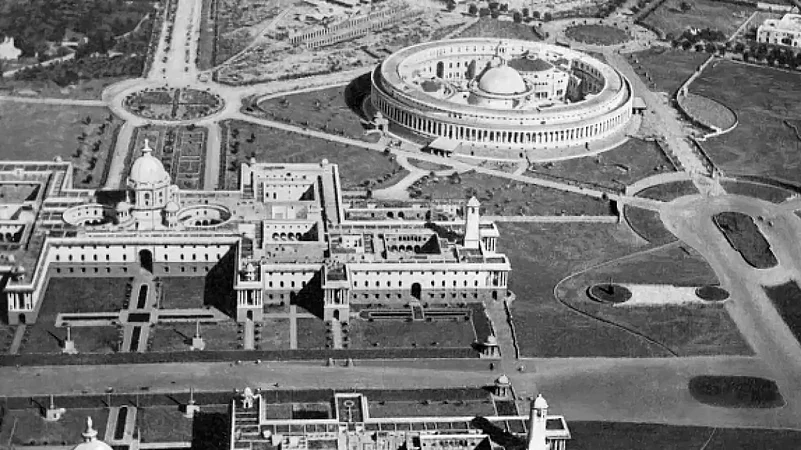In an unexpected development, the Central Government called for a special session of the parliament from September 18 to 22, just weeks after the Monsoon Session of the Parliament concluded on August 11. Five days away from the commencement of the session, questions still remain over its agenda. However, speculations are rife that the government may propose the 'One Nation, One Election' system, rename the country to ‘Bharat’ or implement a Uniform Civil Code – all of which the Narendra Modi-led Union Government has been vociferously advocating for, especially in the last few weeks.
While there is no convention per se, in previous occasions, the government calling the special session convenes an all-party meeting to inform the agenda and build a consensus on the possible issues for discussion. However this time around, Pralhad Joshi, the Union Minister for Parliamentary Affairs stated, in a two-line post on ‘X’ that “important items” were on the session’s agenda, which the government would circulate shortly. However, no such agenda has been presented as of yet.
What is a special session of the parliament?
The term ‘special session’ is not explicitly mentioned in the Constitution. However, Article 352 (Proclamation of Emergency) of the Constitution refers to a “special sitting of the House”, which was inserted to add safeguards to the power of proclaiming Emergency in the country. Under this provision, the President has the authority to convene a special sitting of the House if a Proclamation of Emergency is issued. One-tenth of Lok Sabha MPs can ask the President to convene a special meeting to disapprove the Emergency.
With regards to regular parliament sessions, the Constitution mandates two sessions within a period of six months, and doesn’t prohibit the Parliament from meeting frequently. Article 85(1) states: “The President shall from time to time summon each House of Parliament to meet at such time and place as he/she thinks fit, but six months shall not intervene between its last sitting in one session and the date appointed for its first sitting in the next session.”
This provision allows the President to summon the Parliament any number of times, as and when required. While the President issues the summons, it is the government, led by the Prime Minister, that calls the session into action.
Previous Special Parliament Sessions
The first-ever special session of the Parliament was convened on August 14 and 15, of 1947 to celebrate India’s independence and mark the transfer of power from the British.
During the India-China war in 1962, a delegation led by the then Jan Sangh leader Atal Bihari Vajpayee, pressed for a special session of the Parliament to discuss the war. Prime Minister Jawaharlal Nehru agreed to his demand and convened a session on November 8. Interestingly, a suggestion was made by a member to hold the special session in ‘secret’ considering the ‘sensitive’ nature of the issue. However, Nehru denied the suggestion saying the issues before the House are of “high interest to the whole country”. The 1962 Indian parliamentary resolution on China was passed by the Parliament later in the winter session which pledged to get back the territory occupied by Chinese to the last inch.
Most special sessions have been called to celebrate days of national importance or significant milestones. For example, on 15 August 1972, a special session was called to mark the silver jubilee of India's Independence.
A special session of Rajya Sabha was held in February 1977 for two days, to extend the President’s Rule in Tamil Nadu and Nagaland under the second provision of Article 356(4).
Another two-day special session (158th Session) was held on 3 June 1991 and 4 June 1991, for approval of the President’s Rule in Haryana, under the proviso to article 356(3). On both these occasions the Rajya Sabha met when the Lok Sabha was under dissolution.
A midnight session was called on 9 August 1992 to celebrate the 50-year anniversary of the 'Quit India Movement'.
On 15 August 1997, a midnight session was convened to mark 50-years of India's independence.
During the UPA era, a special session of Lok Sabha was called in July 2008 for a trust vote after the Left parties withdrew support from the Manmohan Singh government.
On 30 June 2017, the Modi government called for a joint midnight session of both the houses to roll out the Goods and Services Tax (GST), calling it the biggest indirect tax reform since Independence. This was the first special session of the Parliament where a bill was discussed. However, major opposition leaders including former Prime Ministers Manmohan Singh and HD Devegowda declined to attend. Some opposition parties had described it as a 'publicity stunt'.
The upcoming five day special Parliament session however, will witness the attendance of the newly-formed Opposition alliance INDIA. The Opposition has in fact prepared a list of things they would like discussed in the session. Inflation, joblessness, the continuing violence in Manipur, the Adani scandal, communal tensions across India, need for a caste census (or any census), the strains on federalism, etc, find mention in the list given by senior Congress leader Sonia Gandhi to PM Modi, urging him to allow discussion on such "matters of public importance".






















